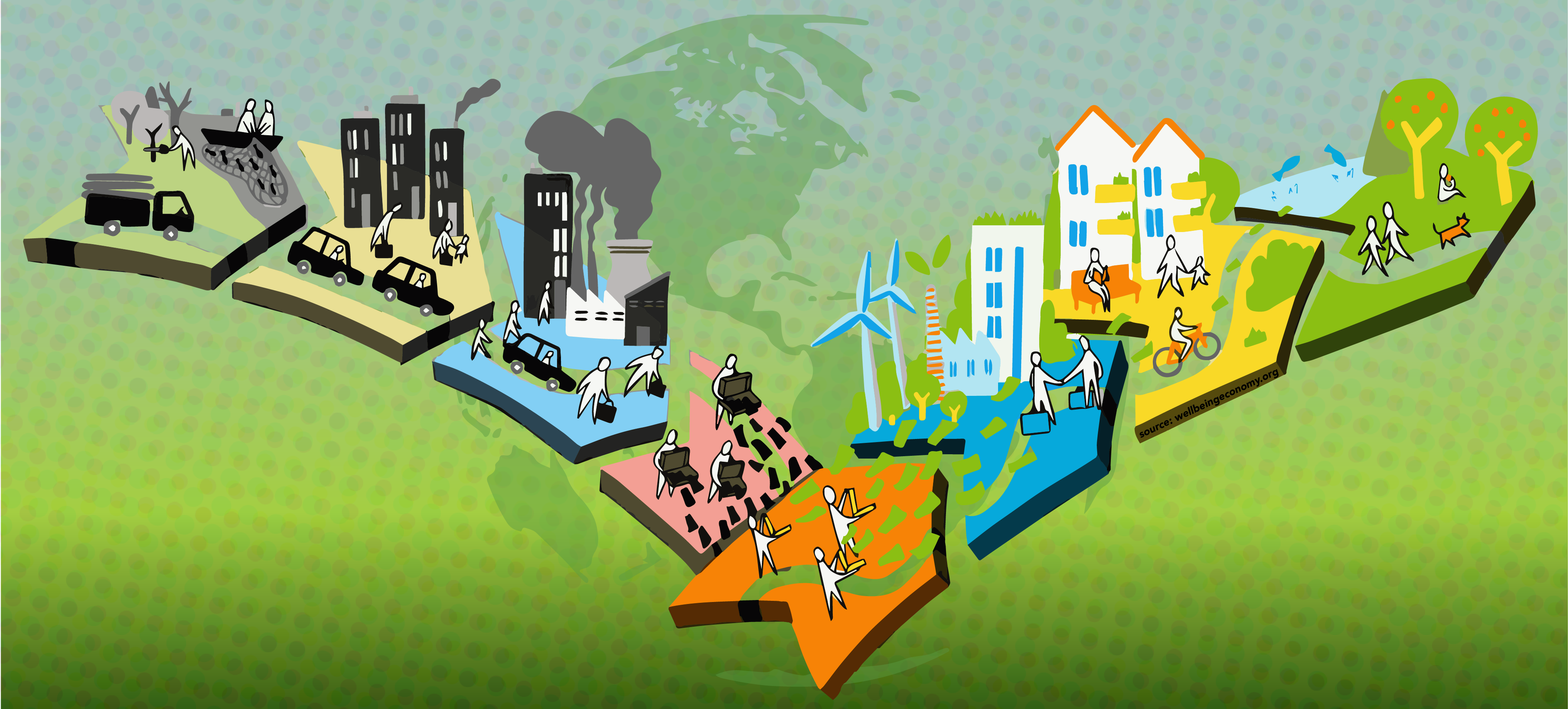Design Sprint Generates Vision for a Wellbeing Economy
Over 60 participants—including Duke students, community advocates, civil engineers, and graphic designers—met virtually over the course of two weeks (May 11-22) as part of the Design Sprint to a Transformative Future—an event sponsored by the Kenan Institute for Ethics in support of the Wellbeing Economy Alliance (WEAll), and co-sponsored by the Program in Gender, Sexuality, and Feminist Studies, the Hart Leadership Program, and the Ormond Center. Small teams used human-centered design principles to create prototypes for a resource hub that could be used by communities around the world seeking to promote wellbeing economies.
“[WEAll] is an international organization trying to bring together and organize people interested in building a future focused on wellbeing of people and planet, rather than continue with a model based on growth, extraction, and profit,” said Dirk Philipsen, Associate Research Professor in the Sanford School of Public Policy and Senior Fellow at the Kenan Institute. Philipsen organized the Design Sprint along with Duke students Alex Nichols, Jessie Xu, Matt Wisner, and Neha Vangipurapu. “One problem almost all [people] run into: not having ready access to the best ideas, networks, and models. Our attempt with the Design Sprint was to begin conceptualizing what such a resource hub or toolkit could look like.”
Teams were asked to imagine what a transition to a wellbeing economy would look like on the local level, and were encouraged to be creative in conceptualizing the methods for connecting users with the information, resources, and networks essential to making this possible. Specifically, they were prompted to envision a community in which “every girl can ride her bike safely and joyfully to a good public school.”
“As the Design Sprint progressed, it became quickly clear how each team took a different approach to address the same prompt,” noted Jessie Xu, a rising junior studying public policy and economics. “They asked many questions, and our job as organizers was simply to say yes—to give participants the creative agency to dream of how they would transition toward a better society.”
In designing platforms, participants were instructed to create prototypes within a very short period of time that would not only meet the specific needs of users, and do so in innovative and groundbreaking ways, but also provide a general architecture that could be utilized by anyone interested in building a wellbeing economy.
At the end of the two weeks, participants submitted video presentations of their prototypes. After having reviewed and evaluated each team’s presentation, organizers selected three teams as finalists: Wellbeing Exchange (Michael Cao T’23, Hannah O’Sullivan T’21, Lindsay Oluyede, PhD Student, UNC); The Lineage (Margot Armbruster T’22, Becca Schneid T’23, Taylor Plett T’21); and Global Goals Quest (Sam Hummel T’03, Megan Richards E’22, Savannah Norman T’21, Jake Jefferies T’22, Zachary Guffey PPS’20/MPP’21). Finalists were given the opportunity to present and have their work assessed by a panel of experts, who provided both a sense of the importance of participants’ work and constructive thoughts and guidance on how to develop their ideas and build off them.
“I decided to sign up . . . because I believe we need to build a future designed for people and for the planet; through this experience, I got to envision a different way of living by brainstorming creative ideas and learning about potential solutions,” Christina Lee, a rising sophomore studying public policy, said.
Experts included Amanda Janoo (Knowledge and Policy Lead at WEAll), Isabel Nuesse (Engagement and Content Lead at WEAll), Usman Tufail (Digital Lead at WEAll), Jillian Johnson (Mayor Pro Tempore of the City of Durham), Jennifer Hill (Executive Director at Circular Triangle), Thad Austin (Senior Director of Strategic Initiatives and Congregational Engagement at the Ormond Center for Thriving Congregations and Communities), and Kashmiri Schmookler (Communications and Community Engagement Coordinator at the Ormond Center).
“I was excited to build community around the ideals of an economy that can work for all of us and came away thinking about the encouragement we got to ‘build’ — to go beyond just critiquing existing institutions in order to construct something better to take their place,” said Margot Armbruster, a rising junior majoring in English.
When asked what’s next for the project, Alex Nichols, a Master of Public Policy candidate at Sanford said, “Our plans going forward include working with a diverse group of people to create an advanced prototype of the resource hub,” adding that the prototype will “hopefully allow us to garner further interest from larger entities with shared objectives, and to create a coalition toward developing a full platform.”
To find out more about the prototypes submitted for the Design Sprint, and to learn how to get involved, please contact Jessie Xu (jessie.xu@duke.edu).

